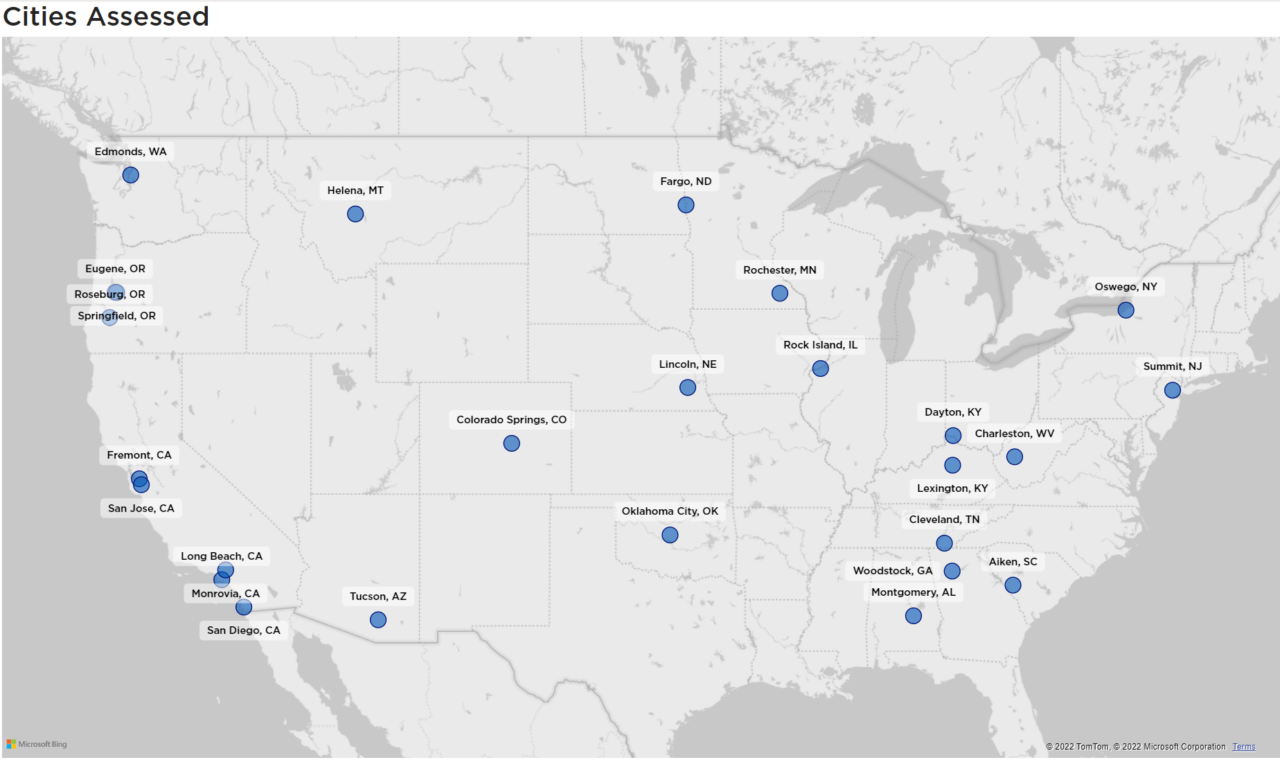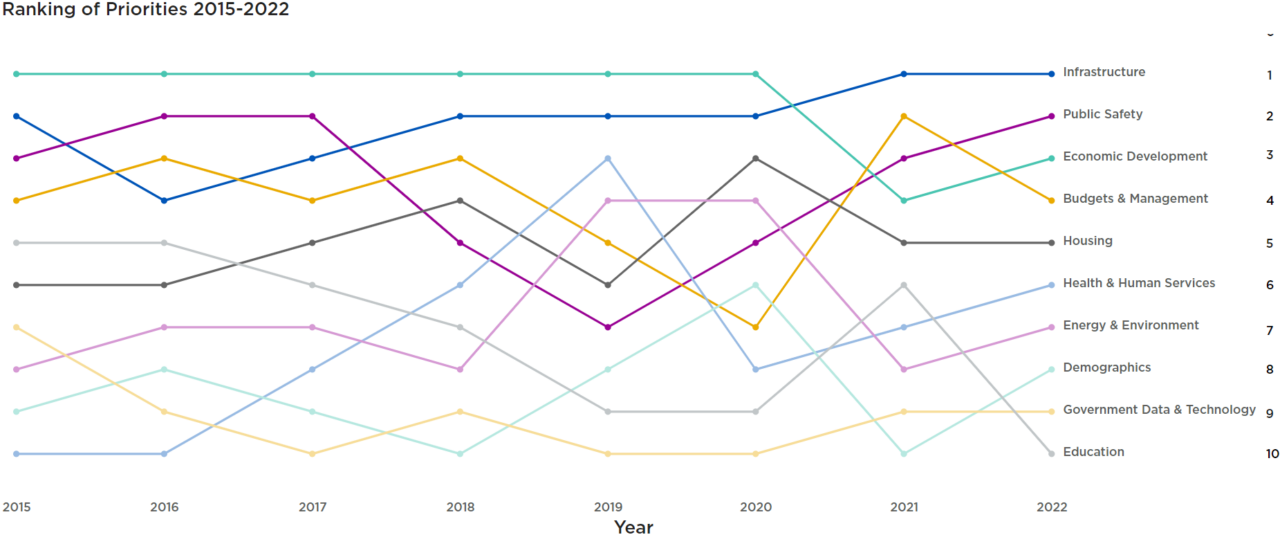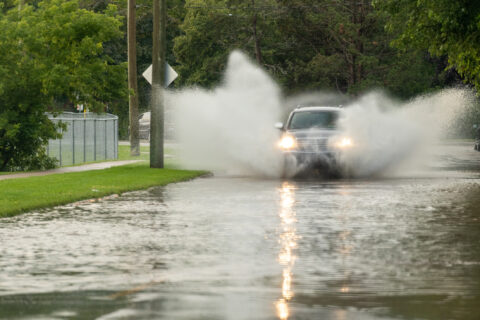While all eyes are on President Biden this week as he prepares to outline his Administration’s priorities for the next year in his annual State of the Union address, many local leaders across the country have already been laying out plans in their own remarks to their constituents over the last several months. To get a sense of what mayors are prioritizing in their own State of the City speeches this year, NLC collected, coded and analyzed nearly 30 mayoral speeches delivered between October 2021 and January 2022 across the country.

Based on this sample of speeches, the top issues on mayors’ minds remained consistent with the priorities they covered in 2021, except for budgets and finance, which dropped two spots in the rankings. The following graph ranks different major topics discussed in mayoral State of the City addresses (from 2015 to 2022) based on the number of instances a topic was covered. As the figure shows, infrastructure was the most-discussed topic in mayoral addresses for the second consecutive year, while public safety was the second most-discussed topic, followed by economic development.

In 2021, rankings were determined by survey results due to the lack of State of the City speeches given during the COVID-19 pandemic. 2022 rankings are based on a preliminary analysis of a sample of 30 speeches.
Infrastructure, public safety and economic recovery remain the top issues occupying the dialogue at the local level. While hundreds of mayors have yet to give their State of the City remarks for 2022 in the coming months, here’s what local leaders are covering in their annual addresses across the country so far:
Infrastructure
Infrastructure priorities dominated mayors’ State of the City speeches, highlighting issues ranging from roads and pedestrian safety to water system maintenance and downtown revitalization. With immense federal infrastructure investments from the Bipartisan Infrastructure Law on the horizon, many mayors discussed the critical local-federal partnerships needed to improve their own cities’ infrastructure in their addresses. As Rochester, MN Mayor Kim Norton put it in her State of the City address, Rochester is awaiting “support from federal infrastructure funding and earmarks to fully flesh [out its infrastructure plans].”
Mayor Ben Baker of Dayton, KY noted that “2022 will be a big year for Dayton in terms of new infrastructure and development projects in the city,” announcing a slew of plans to invest in roadways, transportation and pedestrian infrastructure such as new sidewalks and trails. Mayor John Suthers of Colorado Springs, CO discussed his plans to significantly invest in transportation infrastructure this fiscal year using both state and federal funds – first, by investing $160 million in roads and bridges projects, and $8.5 million to renovate a 13.5-acre park in the city. Furthermore, Colorado Springs’ infrastructure investments are also facilitating more than $500 million in private economic investment in the region that will significantly improve the regional job market.
Public Safety
As in previous cycles, public safety received spotlight attention in mayoral speeches during the November 2021 through January 2022 period. Following the tragic murder of George Floyd that ignited a national movement surrounding criminal justice transformation, an increasing number of cities are putting police-community relationships at the core of their future plans.
Public safety priorities in mayors’ speeches this year ranged from improvements in police, fire and public safety accountability to violence prevention and community engagement. Springfield, OR Police Department is continuing to build trust through community engagement with youth and underrepresented communities. “The police department will continue to send liaison officers to community events and host the Coffee with a Cop [program],” said mayor Sean VanGordon in his 2022 mayoral address. In her address, Mayor Nora Radest of Summit, NJ similarly highlighted plans to increase public safety by directly engaging with the community through outreach, education and active policing.
Economic Development
Mayors are also laser-focused on economic recovery and rebuilding from the pandemic. Issues including neighborhood revitalization, business support and specific assistance for small businesses and enterprises that were most impacted by the COVID-19 recession are front and center. In Lincoln, NE, Mayor Leirion Gaylor Baird highlighted the city’s plans to “distribute $23 million to the industry most impacted by the pandemic — travel and tourism –investing in drawing people to [their] attractions and business districts.” Gaylor Baird also discussed the city’s plans to “distribute $10 million to the small businesses most impacted by the pandemic so that they, in turn, can provide jobs and build community.”
Charleston, WV Mayor Amy Shuler Goodwin stressed the importance of continued investment in small businesses throughout Charleston by offering small business grant funds, citing that the city’s commitments of “more than $750,000 have helped [Charleston’s] businesses make much needed improvements and helped to keep the doors open and lights on” over the last year.
Looking Ahead
By all indications, President Biden’s State of the Union address will support local priorities, just as mayoral State of the City speeches have reflected the significant role of federal investment in rebuilding from the pandemic. New challenges driven by the pandemic necessitated an unprecedented level of cooperation and collaboration among federal, state and local governments that led to the passage of the American Rescue Plan Act. Now, after the historic passage of the Bipartisan Infrastructure Law, cities, towns and villages are on the verge of a new era of reconstructing their communities for years to come.











